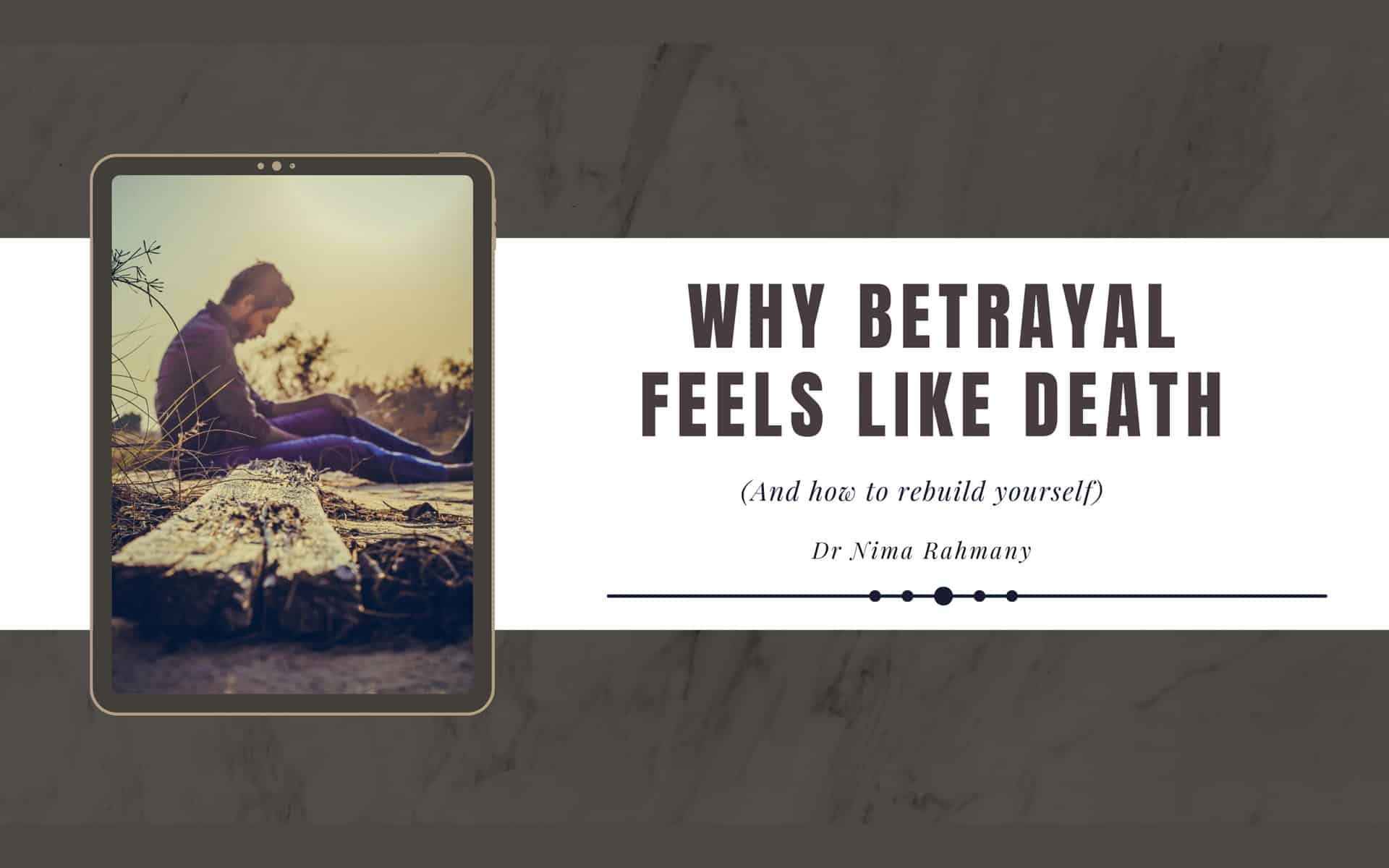Have you ever noticed how a certain trigger
can instantly collapse your sense of self?
One moment you're confident and clear.
The next – in the presence of that trigger –
It’s like you get a flashback…
and become a different version of yourself.
Smaller. Reactive. Disconnected from your power.
This pattern has a name:
Incomplete individuation.
And it might be the invisible force keeping you trapped
in painful relationship cycles –
especially including the aftermath of betrayal.
I was recently reviewing a conversation
about individuation that resonated deeply
with many high achievers in my community.
The insight was profound:
"It's not you I'm trying to run away from.
It's the fear of losing myself because
I can't have myself when I'm with you."
For those who find this familiar,
consider how this pattern might show up in your life:
Perhaps you're highly successful professionally –
making decisions confidently,
leading teams effectively,
navigating complex situations with ease.
Yet in certain personal relationships,
something shifts.
Your boundaries dissolve.
Your clarity fades.
Your authentic voice becomes muted.
You might find yourself thinking:
"Why do I keep attracting the same type of partner?"
or "Why do I become a different person in certain relationships?"
The answer often lies in our earliest relationships –
with our parents or primary caregivers.
Here's what many people discover when exploring this pattern:
There are typically two paths of incomplete individuation:
The first is idealization.
Perhaps one parent was placed on a pedestal –
seen as perfect, infallible, the source of all wisdom and validation.
Their approval became essential for your sense of worth.
The second is persistent resentment.
Maybe you defined yourself in opposition to a parent –
"I'll never be like them" –
yet find yourself unconsciously recreating similar dynamics
in your relationships– or to your horror:
Becoming just like them.
In both cases, the result is the same:
you haven't fully separated your sense of self
from these primary relationships.
One woman I recently spoke to during an intuitive blind spot session
was still identifying as “the black sheep” and had
a tough edge to her– and couldn’t see that she was
reaffirming this identity almost daily.
All this came up after her husband’s affair.
This becomes particularly painful
after experiencing betrayal in adult relationships.
When betrayal occurs,
it doesn't just wound the present relationship.
It activates every unresolved attachment wound from your past.
The pain feels unbearable because
it's not just about what happened now –
it's about every time you've felt abandoned,
unseen, or betrayed since childhood.
And here's the cruel irony for intelligent folks:
The very traits that make you successful in your career
can mask this wound.
Your ability to compartmentalize.
Your skill at managing emotions.
Your focus on achievement rather than feelings.
These coping mechanisms work brilliantly in professional contexts.
But in intimate relationships–
they can keep you trapped in cycles of disconnection.
The physical experience of this pattern is unmistakable:
That tightness in your chest when certain people call.
The flashbacks of betrayal when you go to a restaurant.
The way your voice changes around specific family members.
The sudden brain fog when faced with conflict in close relationships.
The inexplicable anxiety before holiday gatherings.
Your body knows the truth before your mind acknowledges it.
A client of mine – a successful executive
who had experienced a devastating betrayal in her marriage –
described it perfectly:
"I can command a boardroom of fifty people without breaking a sweat.
But sitting across from my husband in therapy?
I literally couldn't find my words.
It was like I became a child again –
desperate for approval, terrified of abandonment."
This wasn't just about her husband's betrayal.
It was about a lifetime of incomplete individuation
that made the betrayal feel like dying inside.
Because when we haven't fully individuated,
betrayal doesn't just feel like losing a relationship.
It feels like losing ourselves.
Here's where it gets even more painful:
This pattern doesn't just affect our romantic relationships.
It shows up in how we parent.
In our friendships.
In our professional relationships with authority figures.
And until we address it,
we remain vulnerable to people who –
consciously or unconsciously – exploit this wound.
The person who can't set boundaries with an unreasonable boss.
The partner who tolerates infidelity because
"at least he comes home to me."
The friend who abandons their needs the moment conflict arises.
All are showing signs of incomplete individuation.
For high achievers,
this pattern creates a particularly painful paradox:
The more successful you become externally,
the more disconnected you may feel internally.
You build empires while your sense of self remains fragile.
You manage millions while struggling to manage your own emotions.
You advise others while doubting your own instincts in relationships.
I know this pattern intimately because I lived it.
At 43 years old – after another failed relationship –
I realized I hadn't truly individuated from my parents.
Despite decades of personal development work,
I was still caught in those early patterns.
So I did something radical:
I moved back in with them.
At rock bottom.
With my tail between my legs.
Not to regress, but to finally grow up.
To learn to be fully myself in their presence.
To love them without needing them to be different.
To stand in my truth without collapsing or attacking.
It was the hardest work I've ever done.
And the most necessary.
And here's what I discovered:
True individuation isn't about cutting people off
(though sometimes temporary distance is needed for clarity).
True individuation is being able to say:
"I can be around you and not lose myself."
This is the foundation of all healthy relationships –
and the key to healing after betrayal.
Because when you're fully individuated:
-
Betrayal still hurts – but it doesn't destroy your sense of self
-
Conflict feels manageable – not world-ending
-
You can love without abandoning your own needs
-
You can set boundaries without fear of rejection
-
You can stay present during emotional flashbacks and dissolve them quickly.
This capacity transforms not just how you relate to others,
but how you relate to yourself.
The path to this freedom isn't quick or easy.
But it is possible.
It begins with recognizing the patterns
that have kept you bound to old relationships –
whether through idealization or resentment.
It continues as you learn to stay connected to yourself
when those old patterns get triggered.
And it culminates in a profound realization:
that your worth and wholeness were never dependent
on anyone else's validation or betrayal.
They were always, already yours.
Your wingman on the adventure,
Nima
(I stand for healed families)
P.S. If this message resonated with you,
and you're ready to explore how incomplete individuation
might be affecting your relationships (especially after betrayal),
I may be able to help.
I'm offering a limited number of
Individuation Assessment Blind-Spot Sessions (valued at $497)
for individuals who want to break free from repeating relationship patterns.
In just one 30-minute call, we can:
-
Identify your specific individuation patterns
and how they affect your current relationships -
Connect these patterns to your experience of betrayal trauma
-
Begin the process of reclaiming your authentic self
-
Create a roadmap for developing healthier relationship dynamics
To be considered, comment or DM with:
-
A brief description of your relationship patterns
-
How these patterns might connect to your early relationships
-
What you hope to achieve through this work
End your response with: "Nima, can I please get a link to your private calendar?"
This conversation could be the beginning
of finally breaking free from the invisible bonds
that have shaped your relationships for decades.
You get to make that call.





